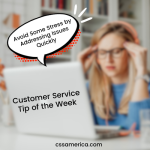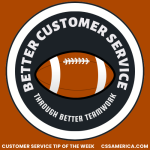I was interviewing a frontline staff person for one of our local government clients recently as part of our CSS Training Development Process. They described their customers and the difficult situations that they face, their tougher conversations with customers.
This individual supports local events, so there’s a lot of planning involved. Unfortunately, this person oftentimes has to say No to the specific request. His agency has to deal with staffing shortages. They receive requests from local residents and organizations that result in fees that those groups are not used to paying. They want the event held at a certain address, but the location is unavailable on that date.
When I asked him for keys to addressing these situations – where they repeatedly have to say No to the specific client request – this is what the individual shared:
- Regarding fees, try to ease them in lightly. Note the different fee ranges for the different types of services, and let them know what they can do within their range even if it’s not everything they wanted to do.
- If it’s a first-time customer, let them know that they can build toward their perfect event over time. Year 1 could be a streamlined and lower cost version, but they could build in Year 2, and by Year 3 have the event they want, the scale they want, the schedule they want.
- Identify alternatives. When the exact location isn’t available on that date, share the alternative addresses, share the no cost options that are in different locations.
Get them focused on the end goal – what they’re trying to accomplish with their events – so that there’s some flexibility in the details of when and how and where that event could be held…and still accomplish the same goal.
When you can’t say “Yes to the Address,” find ways to say Yes to their goals.
Signup for FREE Tips! Contact Us More Resources for You Visit Our Home Page
























